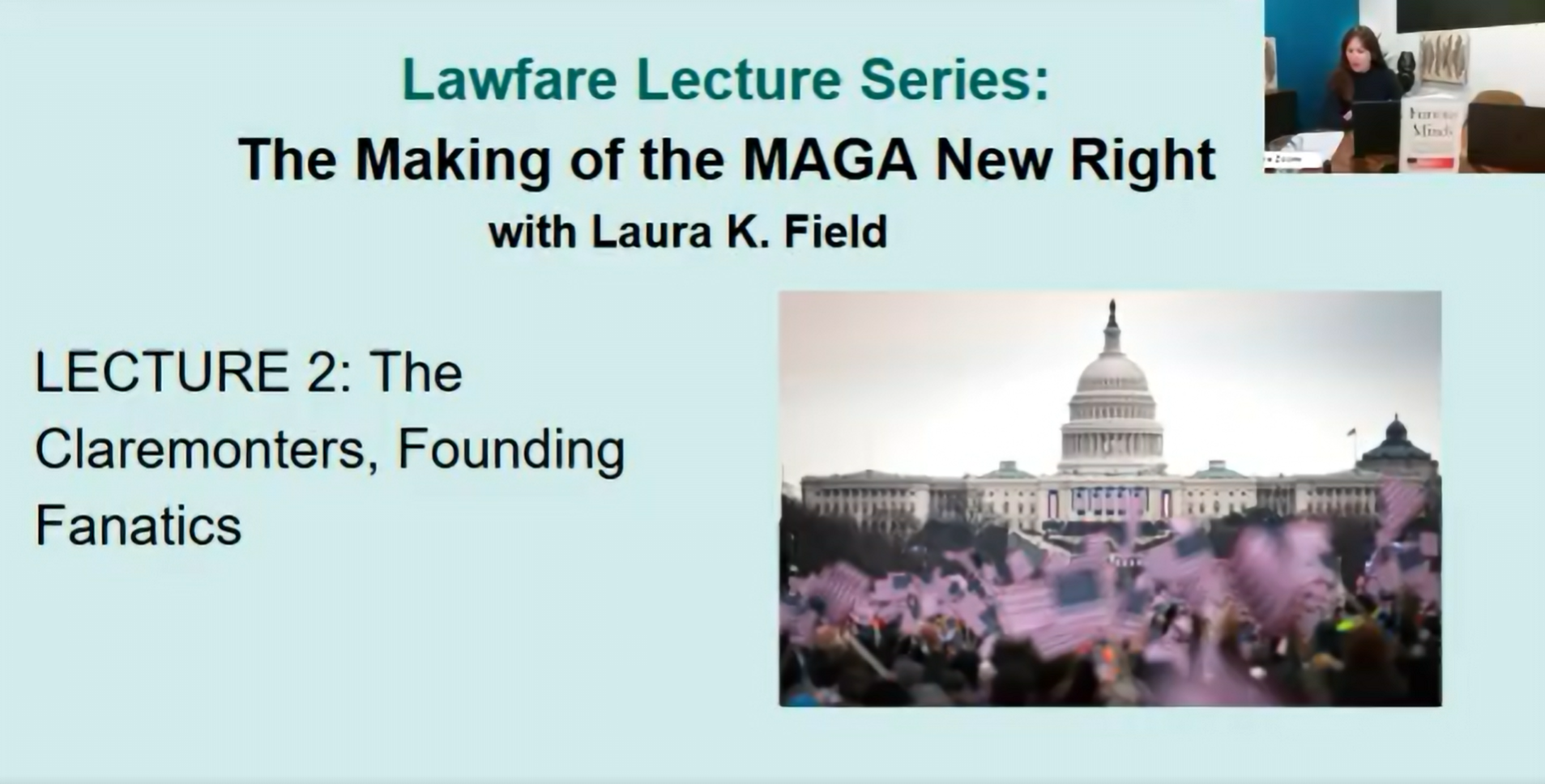Today's Headlines and Commentary
In a January 27 phone call, President Donald Trump asked Mexican President Enrique Peña Nieto to stop publicly saying Mexico would not pay for the southern border wall, according to a transcript that The Washington Post obtained
Published by The Lawfare Institute
in Cooperation With

In a January 27 phone call, President Donald Trump asked Mexican President Enrique Peña Nieto to stop publicly saying Mexico would not pay for the southern border wall, according to a transcript that The Washington Post obtained. The leaders also clashed on illicit drug trafficking and the trade deficit. That same day, another transcript shows that Trump argued with Australian Prime Minister Malcolm Turnbull over an Obama-era deal to accept 1,250 refugees. Trump abruptly ended the conversation in frustration. An official familiar with the conversations noted that Trump had productive meetings with both leaders in person later in the year.
Two members of the Senate Judiciary Committee have introduced legislation that would allow Justice Department Special Counsels to challenge their removal in court, reports the AP. The legislation, introduced by Senators Thom Tillis and Chris Coons, would require a three-judge panel to review the dismissal within 14 days and would apply retroactively to May 17, 2017, covering Special Counsel Robert Mueller. It would also codify Justice Department regulations creating the conditions under which the Special Counsel can be removed by the Attorney General, which are “misconduct, dereliction of duty, incapacity, conflict of interest, or for other good cause, including violation of Departmental policies.” Last week, Senators Lindsay Graham, also on the Judiciary Committee, and Cory Booker said they were drafting a similar bill. Chairman Chuck Grassley has yet to signal his support for either proposal.
On Wednesday, the U.S. carried out a test launch of an unarmed Minuteman III ICBM directed toward a target in the Marshall Islands. The Pentagon qualified that the test was not linked to the North’s launch on Friday of an ICBM that analysts believe to be capable of reaching the West Coast, though military officials noted that it nevertheless illustrated the U.S.’s nuclear defense capabilities. The test also put on view a debate ongoing within the administration about how to best apply diplomatic and military pressure to induce the North to change its nuclear course. China applauded Secretary of State Rex Tillerson for saying that the U.S. would seek a diplomatic resolution to the North Korean nuclear issue.
On Wednesday, an estimated 113 buses carrying Syrian militants, their relatives, and refugees crossed the Lebanese border into Syria as part of a cease-fire agreement concluded between Hezbollah and the al-Qaeda affiliate Jabhat Fateh al-Sham, The New York Times reports. Transferees will be taken to the rebel-held Idlib province, largely dominated by Syrian Al Qaeda forces and the target of frequent attacks by the Syrian military and the Russian Air Force. In July, Hezbollah launched an offensive to dislodge the Al Qaeda fighters from Jroud Arsal, a city along Lebanon’s northeast border that Jabhat Fateh al-Sham, formerly known as the al-Nusra Front, had conquered in 2014. The cease-fire agreement calls for the removal of al-Qaeda fighters from Lebanese territory; the transfer of an estimated 8,000 Syrians to Idlib; and the exchange of prisoners and the bodies of fallen fighters. The total number of Syrians transferred as part of the agreement on Wednesday remains unclear.
The company that provided infrastructure for last Sunday’s elections in Venezuela to select delegates for a constitutional convention reported evidence of manipulation, according to the Post. Days after Venezuelans voted to install 545 pro-government legislators in a National Constituent Assembly empowered to draft a new constitution, the company that furnished the election infrastructure disclosed that results had been “manipulated” and inflated by “at least 1 million” names. In a news conference on Wednesday, Smartmatic Chief Executive Antonio Mugica said that turnout data from the election’s automated balloting system reported figures that were lower than those provided by the Venezuelan National Electoral Council, which reported turnout at 41.5 percent of eligible voters. The allegation adds to the groundswell of fraud allegations from U.S., EU, and Latin American officials. Venezuelan President Nicolás Maduro rejected charges of vote tampering.
A letter sent from the White House to the Senate Foreign Relations Committee reveals conflicting White House positions on the need for a new AUMF for fighting ISIS, Politico reports. Yesterday, Charles Faulkner of the State Department’s Bureau of Legislative Affairs wrote to Senator Bob Corker, the committee chairman, that the U.S. is “not seeking revisions to the 2001 AUMF or additional authorizations to use force.” He further elaborated that the U.S. has “sufficient legal authority” to pursue military action against Al Qaeda and its affiliates, including ISIS. The same day, in a classified briefing with senators, Tillerson and Mattis expressed a willingness to consider legislation for a new AUMF provided it does not call for temporal, geographic, or other restrictions on the use of force that would overly constrain military flexibility. Mattis has made other comments that seem to signal support for a new authorization: in a March appropriations hearing, he called on Congress to debate a new authorization, which he thought would be a “statement of the American people’s resolve.”
The State Department announced that a ban on U.S. citizens traveling to or through North Korea will go into effect on September 1, reports Reuters. The policy applies for one year unless renewed or revoked by the secretary of state and requires that U.S. persons currently in North Korea depart before the ban takes effect. Journalists, humanitarian aid workers, or those whose travel would be “in the national interest” may be eligible to receive special passport validation to circumvent the restriction. North Korea is the only country to which the U.S. government has banned travel.
National Security Advisor H.R. McMaster removed Senior Director for Intelligence Ezra Cohen-Watnick from the National Security Council, Politico reports. For several months, McMaster had faced resistance from Trump in his effort to dismiss Cohen-Watnick, a Trump loyalist hired by McMaster’s predecessor, Lieutenant General Michael T. Flynn. Cohen-Watnick was one of two White House officials to pass evidence to House Intelligence Chairman Devin Nunes about former National Security Adviser Susan Rice’s request that names of Trump associates be “unmasked” in intelligence documents. His dismissal follows those of at least six other high-level NSC officials brought on during Flynn’s brief tenure and may suggest that McMaster’s influence over personnel is increasing.
ICYMI: Yesterday, on Lawfare
Peter Swire argued that online technology companies should not be regulated as public utilities, as White House Chief Strategist Steve Bannon has suggested.
Ed Stein provided an overview of legislation signed into law yesterday by President Trump that imposes new sanctions on Russia, Iran, and North Korea.
Quinta Jurecic posted President Trump’s signing statement and public statement on a sanctions bill targeting Russia, North Korea, and Iran.
Sarah Tate Chambers reviewed the Department of Justice’s seizure of the largest online illicit marketplace, AlphaBay, and the Dutch government’s similar seizure and takedown of the marketplace Hansa. The Justice Department’s statement on the seizures of AlphaBay and Hansa is available here.
Jurecic posted the White House’s letter to Senator Corker outlining the legal basis for U.S. airstrikes in Syria in May and June.
Nicholas Weaver assessed a bill introduced on August 1 by Senators Mark Warner, Cory Gardner, Ron Wyden, and Steve Daines entitled the “Internet of Things Cybersecurity Improvement Act of 2017,” and proposed three additions to the bill. The full text of the bill is available here.
Russell Spivak posted the beginning of his Foreign Policy piece on the process by which Trump’s tweets calling to ban open military service by transgender persons would become a military order.
Elizabeth McElvein reviewed polling data suggesting that public concern about the Russia investigation differs along party lines.
Susan Hennessey and Benjamin Wittes posted part of their open letter on Foreign Policy to Vice President Mike Pence.
Wittes posted the latest episode of Rational Security, entitled the “Send in the Adults” edition.
Email the Roundup Team noteworthy law and security-related articles to include, and follow us on Twitter and Facebook for additional commentary on these issues. Sign up to receive Lawfare in your inbox. Visit our Events Calendar to learn about upcoming national security events, and check out relevant job openings on our Job Board.
More Articles
-

Lawfare Lecture: The Making of the MAGA New Right with Dr. Laura Field, Lecture 2
Watch the second class of the lecture series. -

The Year That Was (2025)
The issues—and Lawfare coverage—that kept our editors up at night in 2025. -

The Week That Was
Your weekly summary of everything on the site.



.png?sfvrsn=bd249d6d_5)

